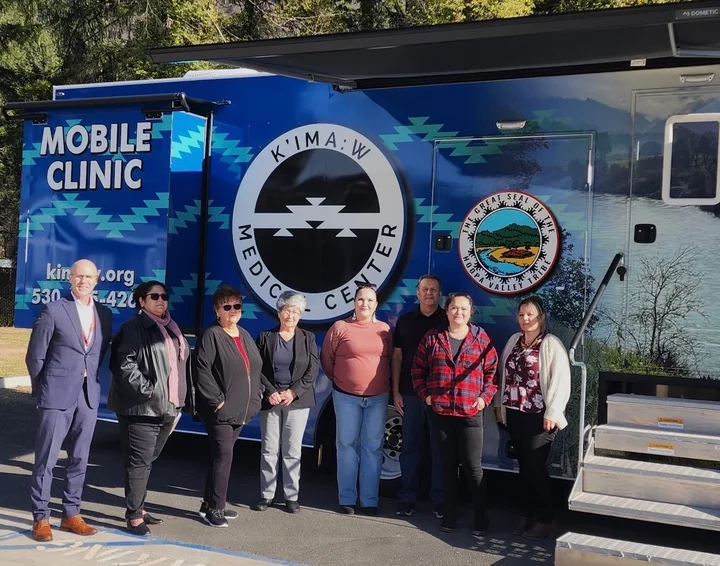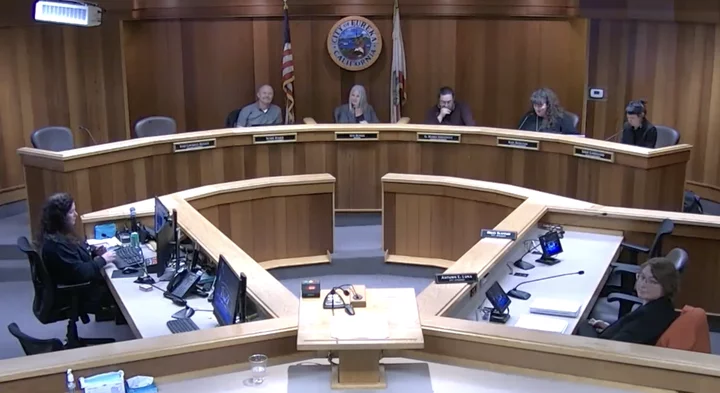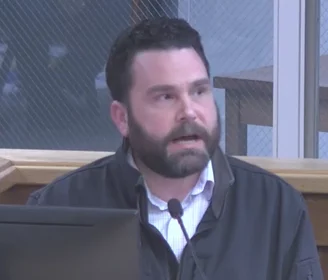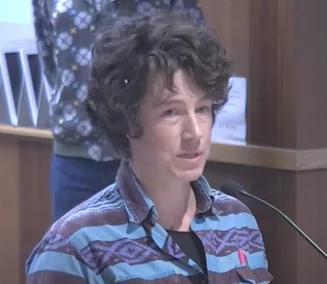Gavin Newsom Has Grown California’s Government to Record Size. Now He, Too, Is Selling ‘Efficiency’
Alexei Koseff / Friday, Jan. 17, 2025 @ 7 a.m. / Sacramento
Gov. Gavin Newsom addresses attendees during his inauguration for a second term at the Plaza de California in Sacramento on Jan. 6, 2023. Photo by Rahul Lal, CalMatters
It’s not only Washington, D.C., where “efficiency” has become the buzzword du jour.
With California facing an uncertain fiscal future, Gov. Gavin Newsom made his own pitch for a leaner state government last week as he previewed his annual budget proposal. Touting billions of dollars in savings from eliminating empty positions and scaling back spending on everything from travel to printing, the Democratic governor compared his efforts to the Department of Government Efficiency, the incoming Trump administration’s push to slash costs across the federal government.
“We’re all taxpayers. We all want to make sure our money is being well invested, not wasted. We want more efficiency,” Newsom told reporters during a stop at the Stanislaus State campus in Turlock.
“Our D.O.G.E. is spelled O.D.I.” he said, referring to the Office of Data and Innovation he created in 2019 to improve public services through technology.
The concept isn’t entirely unfamiliar for Newsom, who has been interested in reinventing government since he served in San Francisco City Hall — and even once wrote a book about it. But his approach as governor has been nearly antithetical to D.O.G.E., which under the leadership of entrepreneurs Elon Musk and Vivek Ramaswamy aims to trim trillions of dollars of what they consider waste from the federal budget by cutting programs and dismantling entire agencies.
Instead, in his six years in the governor’s office, Newsom has steadily guided California’s government to expand its mission and scope: launching flashy initiatives, creating new departments and offering more services to more people, even during periods of deficit. The number of employees per capita — a measurement of the size of state government compared to the population it serves — has reached its highest level in more than five decades of tracking by the state Finance Department.

Even Newsom’s own office has more than doubled in size. At the end of 2024, the governor’s office employed 381 people, according to payroll data provided by the State Controller’s Office, compared to 150 at the end of 2018, before Newsom was sworn in.
It’s another reflection of how Newsom’s governing philosophy contrasts sharply with President-elect Donald Trump and his allies, who treat government as a burden and an obstacle to their ideological goals.
“Gov. Newsom believes there are a lot more societal problems that government should be in the middle of,” Keely Bosler, who served as finance director during his first term, told CalMatters.
Marybel Batjer, who was Newsom’s first government operations secretary and launched the Office of Data and Innovation, said he has expanded state government not because he is an “old dog Democrat who thinks government is good,” but because he wants to help people. She said D.O.G.E. should aim to make government more effective, rather than simply cutting it back.
“You won’t save money that way. You will have more people who are homeless. You will have more people who are sicker. You will have more pandemics,” Batjer said. “Elon Musk doesn’t know shit from Shinola about how government works. He’s a little piggy that’s been at the trough.”
The Trump transition team did not respond to a request for comment.
Yet embracing government efficiency, at least rhetorically, could be a boon to Newsom, who has sought ways to moderate his image after a tough November election for Democrats in which the party lost ground with working-class voters.
Ever eager to be on the vanguard of the Democratic Party, especially as he reportedly mulls a future campaign for president, Newsom has embarked on a tour to promote jobs and economic development in communities that voted for Trump. His budget preview last week in Turlock was the latest stop.
As the governor tries to navigate a fraught relationship with Trump going forward, expressing interest in the president’s ideas could also be a way to build a bridge to the federal government, which controls many of the resources that California needs.
“Language is diplomacy,” said Elizabeth Ashford, a communications strategist who has worked for both Democratic and Republican governors in California. “It would be malpractice if there’s no dialogue.”
Newsom’s early tenure as governor coincided with surging tax revenues and then federal aid from the COVID pandemic, which ballooned the state budget by tens of billions of dollars and underwrote an ambitious and wide-ranging agenda. Total budget expenditures are nearly $100 billion more this fiscal year than before Newsom took office.
Some of that money has gone to one-time projects or to extending existing services, whether because of ideology (making undocumented immigrants eligible for health care and free transitional kindergarten available to all children) or necessity (hiring thousands more state firefighters).
But Newsom, known for his “big, hairy audacious goals” and love of making history, has also consistently added programs and positions with entirely new objectives for state government, swelling its ranks as he transformed its role in Californians’ lives.

The impulse was visible on Newsom’s very first day in January 2019, when shortly after being sworn in, he established the position of California surgeon general to address the root causes of health conditions, alongside an executive order that would allow the state to more broadly negotiate with pharmaceutical companies to lower the costs of prescription drugs.
In his first budget a few months later, Newsom created his 50-person Office of Data and Innovation (then known as the Office of Digital Innovation) and spun off a Department of Youth and Community Restoration to focus on supporting young people in the corrections system.
New government infrastructure has followed regularly in the years since. These include:
- A 106-person Wildfire Safety Division in the California Public Utilities Commission, which grew into the Office of Energy Infrastructure Safety at the California Natural Resources Agency, with nearly twice as many funded positions.
- The Department of Finance Protection and Innovation, a reboot of a business oversight department, with dozens of new employees in divisions to combat consumer financial abuse and study emergency financial services technologies.
- A 13-person office of equity and a 14-person disaster cost tracking unit within the Governor’s Office of Emergency Services.
- The Office of Community Partnerships and Strategic Communications, with more than two dozen staff to manage community engagement and public awareness campaigns.
- California’s first chief equity officer, tasked with developing a statewide equity and inclusion framework.
Additional expansions represent major pieces of Newsom’s platform, including his recent battle against the oil industry. In 2023, he strong-armed the Legislature to create the Division of Petroleum Market Oversight within the California Energy Commission, a watchdog to investigate alleged price gouging.
Though he has not followed through on his campaign promise to set up a single-payer system in California, the governor in 2022 did launch the Office of Health Care Affordability, a regulator that aims to slow the rising cost of care. The California Volunteers office has quintupled in size under Newsom to manage his new initiatives to engage young people in community service and climate action.
Even in his latest budget plan unveiled last week, Newsom proposed creating two new state agencies, to oversee housing and homelessness programs and consumer protection programs. Additional details are not yet available, though state officials said these would largely be a reorganization of departments that already exist.
It’s difficult to get a comprehensive picture of how Newsom’s priorities have enlarged state government.
His Finance Department was unable to answer questions about whether several of his biggest and most expensive initiatives added new positions to the state payroll, including CalAIM, a first-of-its-kind overhaul of medical care for low-income patients; Homekey, which funds the conversion of hotels and motels into homeless housing; the trash pickup program Clean California; and CARE Court, a system to push people with mental illness off the streets and into treatment.
“It’s scary to think that (Newsom) thinks we’re doing good. From my perspective, instead of taking shots at the D.O.G.E., he should be taking notes.”
— Republican State Sen. Suzette Valladares
The increase in the workforce is also driven by laws predating Newsom, including a gas tax hike that has funded thousands of new jobs to repair California’s roads.
Conversely, the governor has shrunk some parts of the state government, such as by closing several prisons.
But the overall trend is up. There are 436,435 government positions in the state budget that Newsom just proposed, including at the public university systems, according to the Finance Department, or about 11.1 state employees per 1,000 Californians. That number has increased from 9.5 before Newsom took office — and is a record high going back to at least 1970, when the Finance Department’s tracking begins.
His office did not respond to a question about how efficiency fits into Newsom’s governing philosophy. But a spokesperson provided a list of initiatives from the Office of Data and Innovation “that are building efficiencies across state departments,” including new tools to forecast community water systems at risk of running dry, evaluate housing projects for streamlined approval, and enhance public participation in the permitting process for toxic substance storage.
State Sen. Suzette Valladares, a Lancaster Republican, told CalMatters that it was “laughable” for Newsom to claim California has been a leader in government efficiency.
“It’s scary to think that he thinks we’re doing good,” she said. “From my perspective, instead of taking shots at the D.O.G.E., he should be taking notes.”
She pointed to the underfunded high-speed rail project and homelessness services as bloated spending by Newsom. Republicans have been highly critical that California’s homeless population continues to increase, despite the governor dedicating tens of billions of dollars in additional money to the problem.
“He’s been at the helm of this mess, yet he has the audacity to mock the federal government’s efforts to cut waste,” Valladares said.
Now the trajectory appears to be shifting course. With growing budget deficits projected in the coming years, Newsom has been forced to tighten California’s belt.
His administration has identified about 6,500 vacant positions that it plans to eliminate and imposed a nearly 8% cut to state operations, which it projects will collectively save almost $5 billion.
“We also have an imperative and that is to meet you where you want us to be,” Newsom said at his budget preview event in Turlock. “That’s leaner, just like you have been in your household. Just like I’ve been in mine. We all have to be more efficient.”
“You won’t save money that way. You will have more people who are homeless. You will have more people who are sicker.”
— Marybel Batjer, Newsom’s first government operations secretary
He’s not the first California governor to take this stance — and those previous experiences suggest how difficult it could be to go further, if Newsom wants to. His office did not respond to a question about whether the governor is planning further cuts to the size of state government.
In 2004, then-Gov. Arnold Schwarzenegger, a Republican, commissioned the California Performance Review to overhaul state bureaucracy. The 2,500-page report recommended more than 1,000 steps to shrink the state government and save billions of dollars annually, including consolidating departments and agencies, eliminating 118 boards and commissions, and cutting 12,000 jobs.
Joanne Kozberg, a veteran of a similar “reinventing government” effort under another previous Republican governor, Pete Wilson, co-chaired the California Performance Review. She told CalMatters that, based on feedback to the report, she suggested focusing their work on just 11 main initiatives, but the Schwarzenegger administration wanted to “go big and bold.” Instead, up against tremendous resistance from Democrats to such sweeping changes, Schwarzenegger dropped his plan and moved onto other priorities.
“Here’s the trouble you run into: How do you implement? Every program has a constituent,” Kozberg said. “It takes a coalition of the enthusiastic. Because nobody really wants to give up their authority.”
Kozberg said that, to succeed, you need not just a leader who is devoted to achieving more efficiency, but also champions inside of government.
“It isn’t sexy. It takes knowledge of government,” she said. “You could do it and you should do it, but it’s going to take a lot of tenacity.”
Eight years later, Democratic Gov. Jerry Brown did push through a reorganization and consolidation plan to “make government more efficient,” aided by a political environment in which an economic recession and steep budget deficits were the prevailing concern. It included eliminating 20 departments, offices and boards, merging the state’s personnel agencies and slashing funding for employee travel and cell phones.
Bosler, who served under Brown before working for Newsom, said some of what California governors have done in the name of efficiency is to demonstrate their values to the public — and some of it is just for show. But it’s difficult to eliminate more than a minor part of state government, she said, because the vast majority of money in the budget pays for services, which are much harder to take away from people.
“Government is not the bastion of efficiency. It’s just not what the incentives are,” she said.
Bosler expressed trepidation about Newsom’s latest approach, demanding an across-the-board 7.95% spending cut for every agency and department. Though it’s easier and appears value neutral, she said, that’s not the effect that it ultimately has on Californians.
“There isn’t a real evaluation of whether this is making government better,” Bosler said. “I worry about all the things that are not going to get done.”
###
CalMatters.org is a nonprofit, nonpartisan media venture explaining California policies and politics.
BOOKED
Today: 6 felonies, 8 misdemeanors, 0 infractions
JUDGED
Humboldt County Superior Court Calendar: Today
CHP REPORTS
Sr299 W / Essex Ln Ofr (HM office): Traffic Hazard
44920 Willis Ave (HM office): Missing Indigenous
ELSEWHERE
County of Humboldt Meetings: Fish & Game Advisory Commission Agenda - Regular Meeting
Governor’s Office: TOMORROW: Governor Newsom and Mayor Lurie to announce new funding for homelessness and mental health efforts in San Francisco
Governor’s Office: Governor Newsom Proclaims Dr. Martin Luther King, Jr. Day 2026
Fishing the North Coast : Emerald water ahead as coastal rivers improve
OBITUARY: Andrew James Lamberson, 1970-2025
LoCO Staff / Friday, Jan. 17, 2025 @ 6:56 a.m. / Obits
Andrew James Lamberson
Aug. 22, 1970 – Jan. 3, 2025
Andrew “Andy” James Lamberson was born August 22, 1970 to Fred and Janet Lamberson, he was the baby of the family. He resided in Trinidad, where he grew up, attending Trinidad Elementary and McKinleyville High School. He was a proud member of the Trinidad Rancheria, and also an employee, dedicating 15 years in more than one department. He valued hard work and was a man of many trades.
He enjoyed swimming and spending the day on sandy bar, skiing, traveling, dirt biking and spending time with his family. Andy also had a true passion for wood, usually carving and crafting his art using the wood from local redwood trees.
In 2010 he graduated Teen Challenge, where he then worked as an intern and touched the lives of many. In that same year he took first place in “The Biggest Loser of Humboldt County” a weight loss competition. With his winnings he was able to make memories with his children.
Andy is survived by his high school sweetheart, Amanda Parsons-Lamberson; their four children Miranda Costa (Bryce Costa), Mariah Lamberson (Jared Patrick), Andrew Lamberson and Makailia Lamberson (Quentin Mosier); their 11 grandchildren, Malachi Costa, Taneyah Lamberson, Jarahlyn Patrick, Maivry Costa, Davina Brown, Brylee Costa, Bryker Costa, Mayleigh Patrick, Jannie Patrick, Mirah Lamberson-Patrick and Drew Mosier; his sister, Wendy Lamberson; sister in-law Shelly Luna; aunt Myra Lowe; nieces and nephews Natae Ramos (Manuel Guerrero), Amanda Christensen (Thomas Christensen), Amelia Buck, Luke Martin and Blaine Martin; his close cousins Butch Rindels, Nichole Rindels, JessieAnn Daughtery, Allen Day, Debbie Day, Kim Day and Glenn Quinn; many great nieces/nephews; and his close friends/co-workers.
He is preceded in death by his parents, Fred and Janet Lamberson; brother Fred Lamberson III; nephew Raymond Eacret-Lamberson; cousin Gary Quinn; and his granddaughter’s dad, Dax Brown.
Andy will be forever remembered by his hilarious humor, willingness to help others, big heart and his invincible spirit.
A celebration of life for Andy will be held Saturday, February 1, 2025 at 12 p.m, at 409 Trinity St., Trinidad Town Hall.
Andy’s family would like to thank everyone for the immense amount of love and support through this hard time.
###
“Be on
your guard; stand firm in the faith; be courageous; be strong. Do
everything in love.”
—1 Corinthians 16:13-14.
###
The obituary above was submitted on behalf of Andy Lamberson’s loved ones. The Lost Coast Outpost runs obituaries of Humboldt County residents at no charge. See guidelines here. Email news@lostcoastoutpost.com.
OBITUARY: Connie Louise Sorensen, 1937-2024
LoCO Staff / Friday, Jan. 17, 2025 @ 6:56 a.m. / Obits
Connie Louise Sorensen
June 30, 1937 - Nov. 23, 2024
Our beloved mother, grandmother, great grandma, aunt and friend passed away peacefully.
Connie was born to John and Phyllis Hurn. She was the best big sister and took care of her younger brothers and sisters. She always took care of the crew: Johnny, Barbara, Gary, Ronny, Donna and Linda.
Connie grew up in Wrangle, Alaska, Washington and California. She loved to read romance novels and true stories. She also had a head for math and numbers, which led her to a job in bookkeeping. She met and married Eugene Fisk in 1957. They raised their family of four — Steven, Robert, Janine and Thomas — in Arcata.
Connie loved gardening and growing dahlias and lilies. She divorced Eugene in 1977.
One memory is mom’s Christmas picture to send out every yea. She would sew the boys matching shirts and Janine a matching dress. She would set up a backdrop and pose us kids for that special picture. Well, four giggling kids and trying to get that perfect picture …OMGoodness. We would act up and she would look at us with that look. She got that perfect picture!
Connie worked for Humboldt County Schools as a clerk and bookkeeper. She also worked for Mad River Schools at the district office as superintendent secretary. She had a head for numbers.
Connie then met the love of her life, Herb Sorensen. They married and started their new endeavor: grapes. Connie and Herb bought and planted Thompson seedless grapes and joined the Sun Maid corporation.
Connie loved family time. We are grateful for all the wonderful memories we had with her. The grandkids all adored grandma.
Every year Connie and Janine would work together to plan and plant her pots and beds with all her favorite flowers so Connie could see all the flowers from her chair in the living room. Mom’s favorite flower was Sweet peas.
Connie often said she was lucky to have enjoyed so many relationships and friends. Our mom was a kind, light-hearted and had an amazing sense of humor. She was funny, and had a smile on her face. Mom was creative and loved crafts. She always crocheted her famous towels. You were lucky if you got one. She started earlier every year so everyone could have one.
Her real passion was reading. She loved romantic novels and true stories. Somedays she would read a book in a day and say,”That was a great book.”
When Connie and Herb retired they enjoyed traveling with the Rolling Amigos. They traveled all over the USA, abroad to Europe and a few cruises to Panama.
Connie was preceded in death by her parents, John Hurn and Phyllis Ochs; her husband, Herb Sorensen; and her brother, Zane Hurn. She is survived by her children: Steven Fisk/Collins (Debra) of Otis, Oregon, and his children Nikki, Amanda, Jacob, and Joshua, along with many grandchildren, great-grandchildren, and great-great-grandchildren; Robert Fisk (Janet) of Ferndale, California, and his children Robbie, Apollo, Felicia, and Nicholas, as well as great-grandchildren Jamie, Emily, Evan, and great-great-granddaughter K.K.; Janine Porter (Dean) of Seal Rock, Oregon, whose family includes Brian Porter (Amy) and their children Michael, Wyit, and Messer Dean, and Jered Porter (Rene) and their children Trinity, Sully, and Saterra; and Thomas Fisk (Terri) of Atwater, California, and his daughters Paige and Ashlee.
She is also survived by her stepchildren: Gail Hought (Eric) of McKinleyville, California, and her children Darren, Shelly, Sonia, and Jeremy, along with great-grandson Aiden; and Darrell Sorensen (Linda) of Merced, California, and his sons Rod and Aaron. Connie leaves behind her siblings: Gloria Neveux of American Canyon, California, and her children Kristy and Michael, along with two great-great-nieces; Barbara Cease of Biglerville, Pennsylvania, and her children Dan, Dawn, Joe, and Teresa; Linda Holly (Bob) of Oakridge, Oregon, and her great-nieces Vanessa and Rachel; and John Hurn (Diem) of Texas. Connie’s legacy of love and family lives on through each of them.
Connie’s radiant spirit and kind heart will be missed by all who knew her. Mom’s life will continue to resonate in the hearts of those she loved and the countless lives she touched.
Graveside services will be at 10:00 a.m. on January 18th at Greenwood Cemetery, 1757 J Street, Arcata. A reception and celebration of life will be at 11:30 a.m. after the service at the Veterans Hall.
####
The obituary above was submitted on behalf of Connie Sorensen’s loved ones. The Lost Coast Outpost runs obituaries of Humboldt County residents at no charge. See guidelines here. Email news@lostcoastoutpost.com.
OBITUARY: Clifford Ray Willoughby Sr., 1940-2025
LoCO Staff / Friday, Jan. 17, 2025 @ 6:56 a.m. / Obits
In the early morning hours of January 3, 2025, Clifford Ray Willoughby Sr. passed away, with his son, Cliff Jr., by his side, the person he loved most in the world.
Clifford Sr. was born in Alameda, Calif. on February 8, 1940, to Joseph Willoughby and Phyllis Millhouse, both of whom he lost while he was still a young child.
Clifford Sr. was without family until his beloved son, Cliff Jr., was born in 1977. Clifford Sr. raised Cliff Jr. as a single father from the time his son was six years old. He was the most devoted father that anyone could hope for. Father and son stuck by one another and did everything together for nearly all of 47 years.
They added to their family with many beloved dogs along the way: Major Shavonne, Boxy, Shasta, Cosmo, Hooch, Fudly, Misty, Mischief, Precious, Butch, Chester and sweet Oreo.
They lived in Medford, Oregon until they took an epic bike ride to settle themselves in the cooler climate of coastal Humboldt County in 1990.
Their adventures together took an unwelcome pause when they were displaced from their housing in Orick in 2021. Clifford Sr.’s health took a downturn and, due to lack of housing, he was involuntarily placed in Granada Nursing Home in Eureka. Father and son worked diligently toward regaining housing so that they could be reunited. The thing they both wanted most in the world was to again be able to sit next to each other on their couch and watch movies. Even with the help of housing programs, it still took 2 and 1/2 years for the two to regain housing. Shortly after their reunion, Clifford Sr. was diagnosed with stage 4 colon cancer, which they suspect could have been discovered and treated far sooner if not for years of what felt very much like utter neglect at the hands of Granada. While father and son were grateful that Clifford Sr.’s life didn’t end in that place and overjoyed to just sit next to one another on the couch once again, their last six months together felt painfully short.
Clifford Sr. is survived, dearly loved, and sorely missed by Cliff Jr., Oreo, and his friend, Tif.
Final arrangements were handled by Ayers Family Cremation. Cliff Jr., Tif and Oreo will visit the beaches in Orick with Clifford Sr.’s remains on his birthday this year.
###
The obituary above was submitted on behalf of Cliff Willoughby Sr.’s loved ones. The Lost Coast Outpost runs obituaries of Humboldt County residents at no charge. See guidelines here. Email news@lostcoastoutpost.com.
K’ima:w Takes it to the Streets! New Mobile Medical Van to Bring Health Care to Patients Across the Far-Flung East County
LoCO Staff / Thursday, Jan. 16, 2025 @ 5:21 p.m. / News
Photo: K’ima:w Medical Center.
Press release from K’ima:w Medical Center, an entity of the Hoopa Valley Tribe:
The K’ima:w Medical Center (KMC) is excited to announce the launch of a new mobile medical clinic dedicated to providing essential healthcare services to community members in the Hoopa Valley and surrounding region. This innovative initiative aims to bridge the gap in medical access, offering a range of services including medical care, dental services, behavioral health and health education directly to those in need. The mobile clinic will travel to various locations, ensuring that residents have access to quality healthcare without the burden of long-distance travel. By bringing healthcare directly to easily accessible areas, we aim to improve health outcomes, increase awareness of available services, and promote a healthier community overall.
The purchase of the vehicle was made possible through the Department of Health Care Services (DHCS) under their Crisis Care Mobile Units (CCMU) funding opportunity. In addition to the vehicle, KMC was able to use the $1.1M funding received to build a storage facility for the Mobile Medical Vehicle, purchase an ADA Lift Van, purchase another Behavioral Health rapid deployment outreach van, and provide funding for Crisis Care outreach services over a 3-year period.
The 40-foot-long Mobile Medical Vehicle was custom made and includes 2 exam rooms, a intake/waiting area, a lab area, and a restroom. The vehicle is fully ADA accessible.
In commenting on the vehicle, K’ima:w Medical Center’s Chief Executive Officer, Ryan Zumalt said “this mobile clinic will make a significant difference in the lives of many by meeting the members where they are at, helping to ensure that essential medical care is just a stop away”.
After touring the vehicle, KMC Board of Directors Chairperson, Angela Jarnaghan, stated “this will aid in our outreach abilities to our people and community. We appreciate all of the hard work our K’ima:w project and executive team made in making this happen. The Board is proud of this project and excited to see it come to fruition.”
The public is invited to the Mobile Medical Unit Open House on Wednesday, February 5th, 2025, at 11 am. The vehicle will be in the rear parking lot behind the MAT Building at 515 Airport Road, Hoopa next to the Clinic. Lunch will follow the walk-through.
Court Battle Between Former Judge Gregory Kreis and Blogger John Chiv Raises First Amendment Questions
Ryan Burns / Thursday, Jan. 16, 2025 @ 4:08 p.m. / Courts
File photo.
A long-running feud between former Humboldt County Superior Court Judge Gregory Kreis and local blogger John Chiv recently made its way into the courtroom, where a judge in small claims court found Chiv guilty of libel for publishing “demeaning” photos of Kreis, a decision that one First Amendment expert found baffling and possibly unconstitutional.
In her judgment, issued on Dec. 11, visiting Judge Ksenia “Kay” Tsenin wrote, “These images [of Kreis] were published with the malicious intent to demean and ridicule and harm the reputation of Gregory Kreis,” and she ordered Chiv to remove the photos from his blog.
That decision might not stand. On Wednesday, in response to a motion from Chiv to vacate the ruling, Judge Tsenin suspended the judgment and scheduled a new hearing for Feb. 24. Before doing so, however, she reiterated her belief that Chiv’s “consistent posting” of two particular photos of Kreis was “malicious” and “not journalistic.”
“Whether it’s defamation is a whole ‘nother story,” Judge Tsenin observed.
Indeed it is, agreed David Loy, legal director for the First Amendment Coalition, a nonprofit dedicated to protecting press freedom. In a recent phone interview, Loy said that, because libel is defined as a published false statement that is damaging to a person’s reputation, the first step in any libel case — the “threshold element” to consider — is whether there has been a published false statement of fact, not opinion.
“It’s the plaintiff’s burden to prove falsehood,” Loy explained.
Can a photo constitute a false statement? Loy said it’s hard to see how, unless it had been manipulated or misrepresented, which Kreis did not allege here. But regardless, malice isn’t the legal threshold, nor is “an intent to demean and ridicule.”
“The truth can be embarrassing,” Loy said.
Kreis, who agreed to resign from the bench last May after being officially censured for 17 acts of admitted misconduct, filed his claim against Chiv in small claims court in August. The central argument of the claim was that Chiv had published a lie about him in a post published on August 19, 2024.
“The defendant has libeled my name when he published a lie on his blog that I threatened him in an open courtroom,” Kreis wrote in his claim. He’s seeking only a single dollar in damages. “Money is not my priority,” he explained. “I just want him to stop disparging [sic] my name in his blog and harassing me which has impacted my ability to practice and my reputation in the legal field.”
Chiv has published dozens if not hundreds of posts about Kreis over the years. (A Google search for “Kreis” on his site returns more than 30 pages of results.) He was closely following a case in which Rory Kalin, then an attorney with the Public Defender’s Office, accused then-Judge Kreis of physically assaulting him and making antisemitic insults during a 2019 Memorial Day celebration at Shasta Lake, as well as the subsequent misconduct investigation by the California Commission on Judicial Performance. Chiv also published details from Kreis’s acrimonious divorce proceedings, including the status of his personal finances, and peppered his coverage with insults.
Last August the animus between the two sparked a tense exchange in court that would become the basis of Kreis’s libel suit. Chiv reported it under the headline, “Was Kreis’ threat to me in open court recorded?” His post said, “I believe Kreis’ display of machismo is meant to intimidate me.”
Kreis, in his small claims suit, disputed Chiv’s account of the exchange, saying he “published a lie on his blog” by describing the interaction as a threat.
Aside from that point of contention, their accounts of the exchange more or less align with each other — and with that of a court bailiff whose witness statement Kreis submitted as part of his claim. It went down like this: Kreis said something along the lines of, “Do you have something to say to me?” Chiv replied that he did not. Kreis said something back — “Are you sure? As it seems like you’ve had a lot to write about me lately,” in Kreis’s version; “I do have something to say to you,” in Chiv’s — and that was the end of it.
In addition to seeking one dollar in damages, Kreis asked for an injunction preventing Chiv “from libeling or defaming me in the future.” In an accompanying trial brief, Kreis complained about Chiv’s use of the two photos below, one showing Kreis and his ex-wife on their wedding day, the other showing Kreis goofing around on a boat during the fateful Memorial Day lake festivities. (Chiv has posted the latter photo numerous times, though it was first published by the Times-Standard, in 2020.)
Photos submitted as part of Kreis’s small claims court filings.
###
Kreis’s brief alleges that Chiv posted the boat photo “for no other purpose than to attempt to ridicule and embarrass.” It also complains about a post in which Chiv refers to Kreis as a “selfish, unremorseful, narcissist prick that has no business practicing as a lawyer; much less in Humboldt.” And it objects to Chiv having published his wedding photo with a “sick to my stomach” emoji [🤢] “attacking the personal appearance of both Plaintiff and his wife.”
Kreis asked the judge to consider “the totality of the circumstances” by looking at Chiv’s “lie” (the alleged courtroom threat) alongside his other blog content, which he says “maliciously attacked Plaintiff as an attorney and posted pictures of Plaintiff in a negative light to harass and disparage Plaintiff’s professional and personal character.”
In her Dec. 11 ruling in favor of Kreis, however, Judge Tsenin mentioned only the photos and the alleged “malicious” intent behind them; it made no mention of the courtroom incident, nor the truth or falsity of anything Chiv posted.
That’s a problem, from a First Amendment perspective, according to Loy — as was Judge Tsenin’s in-court observation that Chiv’s repeated photo-publishing was “malicious” and “not journalistic.”
“If there was no false statement of fact, there can be no defamation liability,” Loy said. Malice, hostility and ill will are not pertinent to that fundamental issue, and opinions about what does and does not constitute journalism are just that, opinions. “Whatever the judge’s personal views of whether [Chiv’s posts] are journalism or not should be irrelevant to the legal question of whether they’re libelous,” Loy said. “This is not a journalism seminar.”
Loy also believes Judge Tsenin likely overstepped her authority in ordering Chiv to remove all copies of the two photos from his website.
“I don’t think a small claims judge has authority to order that kind of injunction,” he said. “The jurisdiction of small claims court is limited to recovering damages.”
Aaron Morris, a partner with the southern California law firm of Morris & Stone, LLP, agrees. “Small Claims Court … can only award money damages – the judge is not permitted to fashion any sort of equitable relief,” he writes in an online article about defamation litigation. “For this reason, most attorneys never think to recommend Small Claims Court for a defamation action since the court has no power to remove the offending posts.”
Asked via phone why he decided to file his case in small claims court, Kreis said he had a variety of reasons, including speed and cost.
“All I wanted to do was stop harassing me through his statements, photos, comments, the constant barrage I’ve gotten even after I’m not public figure anymore, which he doesn’t seem to understand,” Kreis said.
In vacating her previous ruling yesterday morning, Judge Tsenin seemed to concede at least one of Loy’s points.
With Kreis standing behind the plaintiff’s table and Chiv behind the defendant’s, she posed a question: “Wouldn’t any defamation have to be false?”
Kreis brought up the alleged courtroom threat, and Judge Tsenin said the reason she didn’t address that aspect of his claim was that she considered Chiv’s account to be a subjective description — he “felt” threatened. If Kreis’s claim had been solely based on that dispute, she said, she would have ruled against him.
Loy said that’s the correct take, from a First Amendment perspective.
“If the disclosed facts are themselves substantially true, [then] generally speaking, you can’t sue someone for expressing their interpretation or opinion about those facts,” he said. “I mean, one can disagree with the interpretation — is it a threat or is it not? — but that’s a matter of opinion.”
The case is far from over. When Chiv didn’t immediately remove all of the contested photos from his site, Kreis filed an “Order to Show Cause and Affidavit for Contempt.” Chiv, meanwhile, filed his motion to vacate along with a request for appeal. And they each had new filings to be considered on Wednesday. The next hearing for the case is scheduled for Feb. 24.
In the meantime, Kreis may pursue another legal avenue. After Wednesday’s hearing, he said he may seek a civil harassment restraining order against Chiv. However, Loy said the same constitutional issue will apply in that context.
“This has happened, where people do try to do an end run around defamation law by characterizing it as ‘harassment,’” he said. An anti-harassment restraining order “cannot be based on speech protected by the First Amendment, and it can’t be based on the fact that, you know, somebody’s saying mean things about me online.”
###
PREVIOUSLY
- Judge Gregory Kreis Censured for Misconduct, Permanently Resigns From the Bench in California
- Judge Kreis Denies Wrongdoing in Official Response to Misconduct Allegations
- Presiding Judge Gregory Kreis Facing Formal Inquiry Into 19 Counts of Alleged Misconduct, Including Drug and Alcohol Use, Sexually Inappropriate Behavior and Antisemitic Remarks
- Judge Dismisses Rory Kalin’s Lawsuit Against Humboldt County, Public Defender’s Office Employees
- Judge Sides With Publishers of Rio Dell Times in First Amendment Ruling Against Arcata Attorney and Client
Eureka City Council Looks to Increase Enforcement Against Public Camping and Loitering, Streamline Local Ordinances Relating to Homelessness Issues
Isabella Vanderheiden / Thursday, Jan. 16, 2025 @ 1:47 p.m. / Homelessness , Local Government
Screenshot of Tuesday’s special Eureka Council meeting.
###
At a special meeting on Tuesday, the Eureka City Council considered potential changes to two ordinances that restrict unauthorized homeless encampments and loitering in public spaces.
After more than three hours of staff presentations and at-times fervent public comment and discussion, the city council directed staff to consolidate the Camping Ordinance and the Sitting or Lying on Sidewalks Ordinance into a single, simplified ordinance with “more teeth.” The proposed changes would give staff “more tools” to address homelessness and allow the Eureka Police Department to increase enforcement of the ordinance by upgrading penalties from an infraction to a misdemeanor.
The push to streamline the city’s homeless ordinances comes in response to the U.S. Supreme Court’s 2024 Grants Pass v. Johnson decision, which gave cities more power to cite, fine and arrest people for sleeping in public spaces. The ruling effectively overturned the Ninth Circuit’s Martin v. Boise decision, issued in 2018, which held that local governments cannot punish someone for sleeping outside.
Appearing via Zoom, Eureka City Manager Miles Slattery explained that the city attorney’s office reviewed the two ordinances after the recent Supreme Court ruling and determined both documents were “in need of a lot of revision.”
“[The ordinances are] very much similar in certain ways and we felt as though those two needed some revision based on past practices and what we’re currently doing,” Slattery explained. “We felt it would also be a good time to provide an update on our Homeless Action Plan, which is related to this, and go over the milestones associated with that.”
Over the course of the next hour and a half, the city council received detailed presentations on the city’s current enforcement efforts around quality-of-life issues stemming from homelessness. City Attorney Autumn Luna, EPD Sgt. Jon Omey, Managing Mental Health Clinician Jacob Rosen and Special Program Manager Jeff Davis each addressed the council.
Luna’s presentation largely focused on the history of Eureka’s homeless ordinances and the council’s decision in 2021 to shift to an “infraction-only model” per Martin v. Boise.
“The effect of that ruling was pretty profound,” she said. “We removed the ability to issue misdemeanor citations and prosecute on a misdemeanor basis. The only violation of the no-camping ordinance right now is a monetary fine, and there are a couple of tiers of that monetary fine but they’re all relatively low.”
Omey, who leads EPD’s Community Safety Engagement Team (CSET), said the enforcement actions allowed under the city’s current ordinance limit the department’s ability to “help people overcome homelessness.”
“Based [on] my experience, most individuals we contact at camps voluntarily comply,” Omey said. “They’ll pack up when we let them know about a complaint or whatever the problem is. However, there is a small percentage of individuals … who refuse to comply in those situations. … [T]here does come a point where we have to balance the needs of the community with the needs of the environment [and] the needs of the actual individual who’s failing to comply.”
Rosen’s presentation focused on the city’s approach to treatment and the importance of balancing accountability and enforcement while “promoting compassion at the same time.” One such tool is the city’s Law Enforcement Alternative Diversion (LEAD) program, which redirects people at risk of arrest to community-based services instead of jail. The program launched in 2020 but never gained traction, Rosen said.
“As you can imagine, between some difficulties with not having a ton of teeth to it, combined with this thing called COVID … it didn’t take off,” Rosen said. “[W]e are interested in re-implementing [the program], particularly if the option the council chooses is to move forward with escalat[es] the infraction to a misdemeanor because that would add the teeth that are needed to gain some of that motivation to help folks.”
Increasing penalties from an infraction to a misdemeanor would increase accountability, Rosen said.
“[D]eveloping the LEAD program locally would really enhance [EPD’s] ability to both collaborate with CARE [Crisis Alternative Response Eureka] as well as Uplift and get folks connected when they have anosognosia or their substance use disorder is preventing them from developing insight into their situation,” he continued. “It’ll really add that tool that we need to be able to work with individuals who are treatment-resistant, who are not otherwise engaging.”
Davis, who oversees the Community Access Project for Eureka (CAPE) and Uplift, provided an update on the city’s Homeless Action Plan and progress made in addressing the local homelessness crisis. In the last two years, the city has made tremendous strides in increasing its sheltering capacity and rehousing individuals, Davis said.
“We’ve housed over 200 people through our rapid rehousing program,” he said, adding the city is getting ready to open the Uplift Eureka Community Resource Center at the Municipal Auditorium. The city is also getting ready to open its 40-bed transitional housing facility at the Crowley Site on Hilfiker Lane. “What we’re doing here in Eureka is really far ahead of the curve, and we’re continuing to expand and enhance what we’re doing. There’s larger cities that have worked harder and longer — I’m sorry, not harder but longer — on this [issue] and, really, we are much, much, much ahead of where most cities are in providing social services.”
During the public comment portion of the meeting, volunteers with community clean-up crews and several members of the Humboldt Trails Council raised concerns about environmental impacts and safety issues associated with homeless encampments.
One local trail steward, who only identified herself as Susan, urged the city council to do more to address safety issues and litter along local trails. “[P]eople who are homeless are a broad spectrum of people,” she said. “Some of the people that are camping out there now come out to help us on our work days. Others of them shout at us. … The city is doing a lot, but we need to do more, and really, really soon. I hope some positive changes come out of this.”
Other commenters called for more compassion and accused the city of “criminalizing” homelessness. Eureka resident Caroline Griffith asserted that the city would be “creating criminals” by increasing the penalties for people who violate the local ordinances.
“I think it’s really important to note that not everybody who is unhoused is a thief,” she said. “Not everybody who is unhoused is a criminal. When we create a pathway for people to start accruing these tickets … we are tacitly creating a criminal class. … We need to make sure there are places where people can actually exist before we start excluding them from everywhere.”
Griffith also talked about her experience working with the homeless community through various local programs and encouraged the city to treat unhoused people as individuals. “I mean, the range of people who are unhoused is the same as the range of people who are housed,” she said. “We have people who are senior citizens, who are unhoused because of health care expenses. We have folks who are parents. We have children, veterans, people who have really debilitating mental health issues. We have people who have substance abuse issues.”
During the council’s discussion, Councilmember Kati Moulton asked how increasing the penalty from an infraction to a misdemeanor would affect someone experiencing homelessness. Luna noted that infractions are “monetary penalties only” whereas misdemeanors “carry the possibility of jail time.”
“There’s also the possibility of other programs that we could and intend to put in place with that,” she said, referring to the LEAD program. “Jail time, traditionally, is the ‘teeth’ that you’re talking about when you talk about misdemeanor prosecution versus infractions.”
Moulton acknowledged that issuing an infraction “doesn’t make much of a difference” when an individual doesn’t have money. “But they do have their freedom, so if you threaten to take that away, that’s more of a consequence, more of a motivation,” she said.
“That’s the idea,” Luna said, noting that the money recouped from an infraction is “close to zero.”
Councilmember G. Mario Fernandez, who showed up late to the meeting, asked if and when staff would be able to launch the LEAD program and whether the city had adequate resources to do so. Slattery confirmed that the resources are there, adding that the city could theoretically launch the program “tomorrow” because the framework is already in place.
“Tomorrow we could literally have that done [but] I think we need something in place to allow us to have the authority to do so,” he said.
Fernandez asked if he was referring to the proposal to upgrade infractions to a misdemeanor, expressing concern that doing so would effectively “criminalize” homelessness in Eureka.
“First of all, I take exception to saying it’s criminalizing. Let’s keep this in context here,” Slattery said. “Giving a ticket for camping as a misdemeanor is no different than giving somebody a ticket for a drunk in public. They’re misdemeanors. Calling that criminalization, I think, is a little out of context. … If it wasn’t an infraction right now and it ended up being a misdemeanor, that misdemeanor could be charged to an individual tomorrow, and prior to going to court or being prosecuted by the city attorney, they could choose to do a diversion program.”
Councilmember Leslie Castellano expressed gratitude to city staff and local nonprofit organizations that offer support to the unhoused community. Even so, she admitted that the city is “struggling to find solutions.”
“There are things that haven’t gotten better despite the amount of resources — which is pretty extensive — that we’ve put into it,” she said. “I hear the folks on the trails council who say it’s getting worse again. I recognize that. … I also trust our city attorney. She wants to change people’s lives — not criminalize people’s lives — for the better.”
Councilmember Scott Bauer acknowledged that the city cannot take a one-size-fits-all approach to enforcement but emphasized that there is a “criminal element” that exists at some homeless encampments.
“In essence, a little bit of tough love [is needed], unfortunately,” he said. “Another tool is needed and our law enforcement is not going to use it like a hammer. It’s going to be used delicately. I truly believe that it will be used when it needs to be used to get people help.”
As the meeting approached the three-hour mark, Luna assured the council that staff would take their feedback into consideration while drafting a streamlined ordinance with increased enforcement. The draft ordinance will come back to the council sometime in the next couple of months.
The council agreed to receive and file the presentation, with Councilmember Renee Contreras-DeLoach absent, but did not take any further action.












